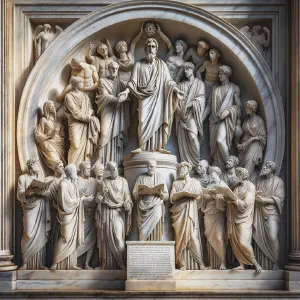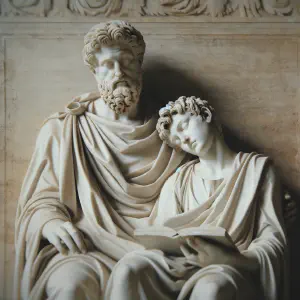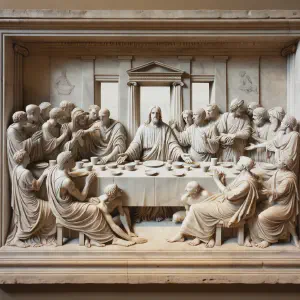The Feast of Unity
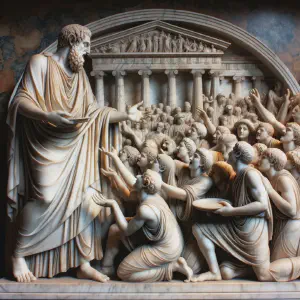
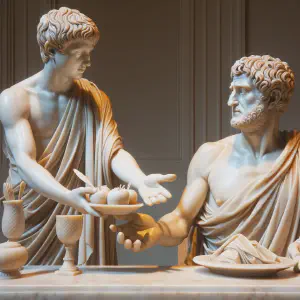
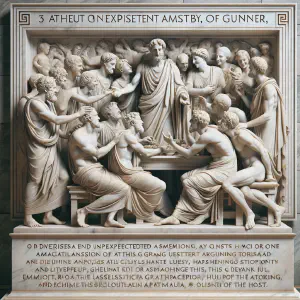
This gathering, now vibrant and full of life, stood as a living parable of the Gospel of Luke 14:15-24. The host’s initial disappointment was transformed into a celebration of community and love, a testament to the Lord’s invitation to all, regardless of status or circumstance. In this moment, the message of Christ resonated deeply - the Kingdom of God is not just a distant promise, but a present reality, realized in acts of love, humility, and hospitality, embracing all as one in the Body of Christ.
Five Questions
What does the story “The Feast of Unity” reveal about the Christian understanding of unity and service?
The story illustrates that true Christian unity and service go beyond social status and personal convenience. It echoes the message of Romans 12, where we are called to use our diverse gifts for the collective good, serving others with humility and love. The host’s decision to invite the marginalized instead of the elite shows a profound understanding of Christ’s teachings - that everyone is a valuable part of the Body of Christ, deserving of love and inclusion.
How do the teachings in Psalm 131 relate to the host’s actions in the story?
Psalm 131 speaks of a heart that is not proud and finds peace in humility and simplicity. This mirrors the host’s actions when he shifts his focus from the elite to the marginalized. His ability to find contentment and joy in serving those less fortunate reflects the Psalm’s message of quieting one’s soul, akin to a child resting in its mother’s arms. It’s about finding inner peace through acts of humility and compassion, rather than seeking grandeur.
In the story, how does the host’s response to the initial rejection embody the message of Matthew 11:28?
In Matthew 11:28, Jesus invites those who are burdened to find rest in Him. Similarly, the host, after being rejected by the initially invited guests, turns his attention to those burdened by society - the poor, crippled, blind, and lame. His invitation to them can be seen as offering rest and joy through the feast, akin to Jesus’ promise of rest and comfort. This shows a deep understanding of extending Christ’s love and rest to those who are often overlooked.
How does Luke 14:15-24 influence the central theme of the story?
Luke 14:15-24 directly inspires the storyline. The parable of the great dinner, where the invited guests make excuses and the host subsequently invites the marginalized, underlines the theme of the story. It emphasizes the idea that the Kingdom of God is open to all, especially those who are not typically honored or invited. The host’s actions in inviting the poor and the disabled reflect Jesus’ teaching of extending God’s invitation to everyone, regardless of their social standing.
What overarching lesson do these scriptures and the story provide for modern Christians?
These scriptures and the story collectively teach modern Christians the importance of practicing inclusivity, compassion, and humility in their daily lives. They encourage us to look beyond our personal biases and societal norms, to extend God’s love to all, especially those who are marginalized or overlooked. The lessons remind us that our actions and attitudes should mirror Christ’s teachings, focusing on unity and service as core elements of our faith and daily practice.
Bible Study
Romans 12:5-16ab
Brothers and sisters:
We, though many, are one Body in Christ
and individually parts of one another.
Since we have gifts that differ according to the grace given to us,
let us exercise them:
if prophecy, in proportion to the faith;
if ministry, in ministering;
if one is a teacher, in teaching;
if one exhorts, in exhortation;
if one contributes, in generosity;
if one is over others, with diligence;
if one does acts of mercy, with cheerfulness.Let love be sincere;
hate what is evil,
hold on to what is good;
love one another with mutual affection;
anticipate one another in showing honor.
Do not grow slack in zeal,
be fervent in spirit,
serve the Lord.
Rejoice in hope,
endure in affliction,
persevere in prayer.
Contribute to the needs of the holy ones,
exercise hospitality.
Bless those who persecute you,
bless and do not curse them.
Rejoice with those who rejoice,
weep with those who weep.
Have the same regard for one another;
do not be haughty but associate with the lowly.
In this passage, Paul the Apostle, a pivotal figure in early Christianity known for his missionary journeys and epistles, addresses the Christian community in Rome. He emphasizes the diversity and unity within the Body of Christ, advocating for the use of individual gifts in service to the community. This aligns with Catholic values of community, service, and the dignity of each person (Catechism of the Catholic Church 1937-1938). Paul’s exhortation to live in harmony, practice hospitality, and bless persecutors resonates with the Beatitudes and the Corporal Acts of Mercy, underscoring the importance of charity, patience, and humility.
Psalm 131:1bcde, 2, 3
R. In you, O Lord, I have found my peace.
O LORD, my heart is not proud,
nor are my eyes haughty;
I busy not myself with great things,
nor with things too sublime for me.
R. In you, O Lord, I have found my peace.
Nay rather, I have stilled and quieted
my soul like a weaned child.
Like a weaned child on its mother’s lap,
so is my soul within me.
R. In you, O Lord, I have found my peace.
O Israel, hope in the LORD,
both now and forever.
R. In you, O Lord, I have found my peace.
Authored traditionally by King David, a central figure in Jewish, Christian, and Islamic traditions, Psalm 131 is a song of ascents expressing humility and trust in God. David, known for his heartfelt psalms, portrays a soul content in God’s presence, akin to a child with its mother. This psalm aligns with Catholic teachings on humility (Catechism 2559) and the virtue of hope (Catechism 1818). It reflects the essence of the First Commandment, calling for a humble and trusting heart towards God, and resonates with the spiritual works of mercy, particularly comforting the sorrowful and counseling the doubtful.
Luke 14:15-24
One of those at table with Jesus said to him,
“Blessed is the one who will dine in the Kingdom of God.”
He replied to him,
“A man gave a great dinner to which he invited many.
When the time for the dinner came,
he dispatched his servant to say to those invited,
‘Come, everything is now ready.’
But one by one, they all began to excuse themselves.
The first said to him,
‘I have purchased a field and must go to examine it;
I ask you, consider me excused.’
And another said, ‘I have purchased five yoke of oxen
and am on my way to evaluate them;
I ask you, consider me excused.’
And another said, ‘I have just married a woman,
and therefore I cannot come.’
The servant went and reported this to his master.
Then the master of the house in a rage commanded his servant,
‘Go out quickly into the streets and alleys of the town
and bring in here the poor and the crippled, the blind and the lame.’
The servant reported, ‘Sir, your orders have been carried out
and still there is room.’
The master then ordered the servant,
‘Go out to the highways and hedgerows
and make people come in that my home may be filled.
For, I tell you, none of those men who were invited will taste my dinner.’”
This passage from Luke’s Gospel presents the Parable of the Great Banquet, told by Jesus, the central figure of Christianity. The parable depicts a man, typically interpreted as symbolizing God, inviting guests to a banquet. Those invited offer excuses and are subsequently replaced by the marginalized. This aligns with the Catholic ethos of inclusivity and the preferential option for the poor (Catechism 2448). The parable illustrates the concepts of grace and salvation, available to all irrespective of status, and emphasizes the necessity of responding to God’s call, aligning with Catholic teachings on the universal call to holiness (Catechism 2013) and the works of mercy.
Lessons
These passages remind us of the Christian call to embrace unity in diversity, serve with humility, and extend compassion to all. Like the body of Christ, we are individually different yet collectively one, each with unique gifts to offer in service to God and others. The Gospel and the Psalm encourage us to find peace in humility, to seek simplicity over grandeur, and to remember that the Kingdom of God is open to everyone, especially those marginalized by society. This teaches us to not only attend to our personal relationship with God but also actively engage in loving and serving our community, reflecting Christ’s love and inclusivity.
Meditation Prayer
